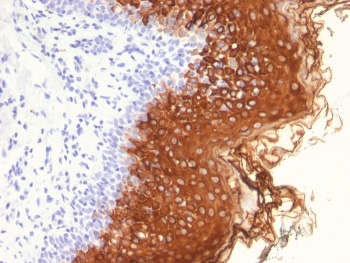- Tel: 858.663.9055
 Email: info@nsjbio.com
Email: info@nsjbio.com
- Tel: 858.663.9055
- Email: info@nsjbio.com
KRT10 Antibody detects keratin 10, a type I intermediate filament protein expressed in the suprabasal layers of stratified epithelia. Keratin 10 partners with keratin 1 to form structural filaments that maintain epidermal stability during differentiation. This pairing provides strength to the upper layers of skin, ensuring resilience and barrier function.
Mutations in KRT10 cause epidermolytic ichthyosis, a genetic skin disorder characterized by blistering, hyperkeratosis, and scaling. Abnormal expression of KRT10 has also been observed in hyperproliferative skin diseases and epithelial cancers. The KRT10 Antibody is therefore an important reagent for studying epidermal differentiation, genetic keratinopathies, and pathological remodeling of skin.
Because of its restricted expression and strong clinical relevance, Keratin 10 Antibody reagents are used across dermatology, pathology, and translational medicine.
NSJ Bioreagents supplies KRT10 Antibodies validated for immunohistochemistry, immunofluorescence, western blotting, ELISA, and flow cytometry. Each KRT10 Antibody is rigorously tested for specificity to keratin 10 while minimizing cross-reactivity with related keratins such as KRT1.
By selecting a KRT10 Antibody from NSJ Bioreagents, researchers gain reagents optimized for reproducibility. Our antibodies provide strong staining in suprabasal epidermis, consistent protein detection in lysates, and robust results across experimental platforms. With detailed datasheets, recommended positive controls, and validated protocols, NSJ Bioreagents ensures that Keratin 10 Antibody products support both discovery research and diagnostic pathology.
The KRT10 Antibody has broad applications across skin biology, pathology, and translational studies.
KRT10 Antibodies identify suprabasal keratinocytes during epidermal maturation.
The KRT10 Antibody clarifies epidermal barrier formation and stratification.
Keratin 10 Antibody reagents support studies of keratinocyte differentiation pathways.
Mutations in KRT10 cause epidermolytic ichthyosis, making KRT10 Antibodies essential for research.
The KRT10 Antibody detects molecular defects in patient samples and models.
Keratin 10 Antibody reagents help clarify mechanisms of keratin-related fragility.
KRT10 Antibodies distinguish suprabasal keratin expression in skin biopsies.
The KRT10 Antibody supports diagnosis of keratinization disorders and ichthyosis.
Keratin 10 Antibody products contribute to biomarker discovery in hyperproliferative disease.
KRT10 Antibodies are applied to study squamous cell carcinoma and skin tumors.
The KRT10 Antibody clarifies keratin remodeling in cancer progression.
Keratin 10 Antibody reagents provide biomarkers for prognosis and therapy response.
KRT10 Antibodies detect altered expression during injury and repair.
The KRT10 Antibody supports studies of epithelial response to stress.
KRT10 Antibodies validate keratinocyte differentiation in stem cell-derived skin models.
The KRT10 Antibody ensures correct suprabasal identity in engineered epidermis.
KRT10 Antibodies are used in preclinical studies of epidermolytic ichthyosis therapies.
The KRT10 Antibody supports biomarker validation in dermatology clinical trials.
Keratin 10 Antibody reagents help assess drug effects on epidermal differentiation.
Keratin 10 is a hallmark of suprabasal epidermis and a critical marker of differentiation. The KRT10 Antibody enables precise detection of this protein, while Keratin 10 Antibody reagents more broadly support research in dermatology, oncology, and regenerative biology.
In basic research, KRT10 Antibodies clarify keratinocyte maturation and barrier integrity. In genetics, the KRT10 Antibody provides insights into epidermolytic ichthyosis. In oncology, Keratin 10 Antibody products are valuable for tumor classification and biomarker development.
Clinically, KRT10 markers are used to diagnose and monitor keratin-related disorders, evaluate skin differentiation, and guide treatment strategies. The KRT10 Antibody thus bridges basic molecular insights with clinical care, supporting progress in dermatology and patient outcomes.
Keratin 10 is a suprabasal epidermal marker central to skin differentiation, disease, and oncology. The KRT10 Antibody equips scientists and clinicians with a trusted tool for detecting keratin 10, while Keratin 10 Antibody reagents more broadly support advances in dermatology, pathology, and regenerative medicine. By connecting fundamental biology with clinical applications, these antibodies remain indispensable for biomedical research and healthcare progress.

IHC staining of FFPE human skin tissue with KRT10 antibody (clone AE20).